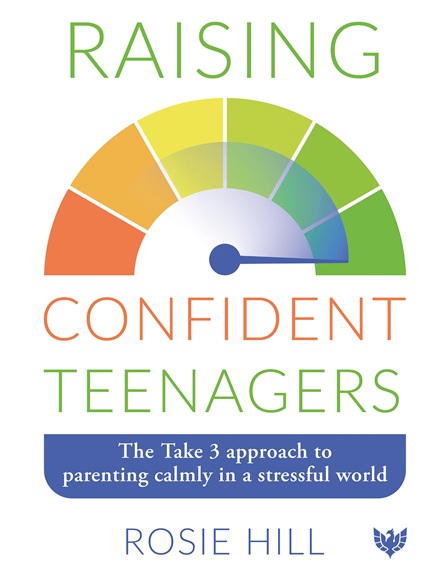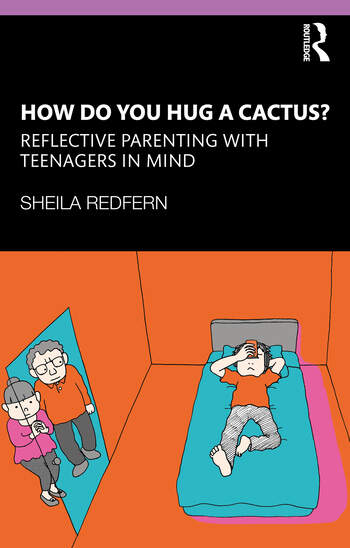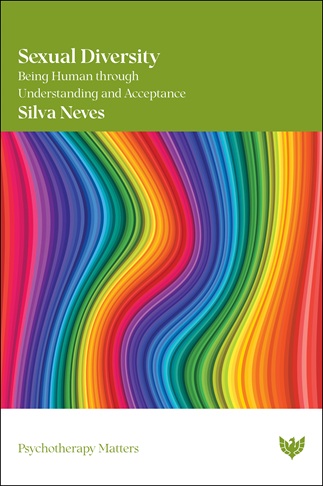Raising Confident Teenagers: The Take 3 Approach to Parenting Calmly in a Stressful World

Book Details
- Publisher : Karnac Books
- Published : April 2025
- Cover : Paperback
- Pages : 262
- Category :
Forthcoming - Category 2 :
Child and Adolescent Studies - Catalogue No : 98068
- ISBN 13 : 9781800133075
- ISBN 10 : 1800133073
There are currently no reviews
Be the first to review
An easily accessible and invaluable resource for parents of teenagers who want to improve the parent–teen relationship, and for professionals working with young people and their families. Packed with proven practical advice that will help with navigating those turbulent teenage years, reducing conflict, and building good mental health.
This book is about relationship, about building rapport and understanding between parents and teenagers at a stage when it’s easy for relationships to crumble or sour. It’s also about behaviour: tricky adolescent behaviour but also our own (perhaps sometimes tricky), adult behaviour. It’s packed with skills and strategies proven to help parents communicate effectively with their children and develop their confidence. It’s a book for all parents (or carers) but it’s a particularly valuable resource for those whose adolescents are exhibiting behaviour that’s challenging, or whose mental state is causing concern. Many young people are suffering since Covid/lockdown, and support services often lack funding. When children suffer, parents suffer – they too need support.
It’s based on the principles of the evidence-based Take 3 parenting course, written by the author when she was employed as a parenting worker for the Youth Offending Service (see www.take3parenting.co.uk), which is used around the UK and overseas. It can be used as a self-help parenting course, designed so that parents can work through it alone, or with others. There’s also a ready market for it amongst workers already using Take 3 to support parents, and it’s an invaluable handbook for professionals caring for young people or working with families (in schools, CAMHS, YOS, etc.).
A core concept of Take 3 is that no one can change other people but they can change themselves. Parents at their wits’ end trying to alter their adolescent’s behaviour develop in confidence and transform their parenting when given a chance to discuss anxieties and feel supported to try out new strategies. As they make changes, their children’s behaviour changes, families become happier. When families are in crisis, parents typically become confused, helpless, angry, and/or depressed, and love gets lost, but when they’re supported and equipped with new skills, love and connection can flow again.
This book contains a wealth of information about adolescence, reasons for misbehaviour, trauma, sibling rivalry, teenage brains, adult relationships, ‘teens & screens’ etc., and offers tried-and-tested strategies for parents to try out. Coming from a deeply supportive and encouraging place and acknowledging that all parents are always doing their best, the Take 3 approach invites parents to reflect on their own behaviour and what they’re modelling to their children. The number one parenting skill is self-care, and the book introduces Take 3 breathing to help parents stay calm when family life is turbulent and stressful.
Reviews and Endorsements
What professionals say:
I am delighted to endorse this book. I cannot stress how valuable it will be for parents and for professionals. The book is based on the author’s work which involved the development of Take 3, an outstanding parenting programme. I was involved in the early stages of development, and so I can vouch for its value and effectiveness. I have long experience in running groups for parents of young people, and I know only too well the hunger for credible and accessible information on this age group. Parents of teenagers face many challenges today, not just as a result of the increase in mental health problems, but also because of the worries about the impact of social media, and the continuing effects of the pandemic. This book will be an important resource for all who live and work with young people and their families. I hope it will reach a very wide audience.
Dr John Coleman, OBE, author of Why Won’t My Teenager Talk to Me?
An excellent resource for understanding teenage behaviours and boosting relationships at home.
Mark Warren, Senior Family Help Practitioner, Leeds
This new book by Rosie Hill brings together all the original strategies and ideas from her Take 3 course, and incorporates contemporary and innovative material into an accessible and comprehensive format for parents, carers, and professionals. It is an invaluable resource to work through, have at hand, and use at your own pace. Raising Confident Teenagers is fundamentally about building and improving relationships with young people (and potentially with others!) by putting the skills she introduces into practice. It will help guide you through the often choppy waters of family life with teenagers. I have witnessed the many light-bulb moments parents and carers experience when using Rosie’s material and would urge you to read this book and experience this for yourself.’
Sue Bidmead, Specialist Counsellor and Supervisor – Children and Young People
What parents say:
Take 3 probably saved my child’s life; what I learned on the course certainly saved our relationship. I needed to unlearn some of the generic bad parenting we all pick up. The course helped me understand how to communicate and interact positively with my child, and work out how to understand and communicate effectively with the child I had at that time, who was unhappy. Take 3 changed everything for us, for the better.
Ruth, a mum, Oxfordshire
I found [this book] all really useful for me, and surprisingly reassuring. I think reading about parents with perhaps more difficult teenagers puts one’s own difficulties into perspective, and I should imagine others may feel the same way too. That said, the guidance is pretty universal and applies whatever the issues, and written in a way that’s easy to interpret in relation to one’s own situation. It’s really concise and practical but just all feels very supportive (unlike some self-help books which just make you feel as if you’ve done it all wrong). I also liked that it discusses the issues of families and not just one-to-one relationships between parents and their children. The overarching suggestion that one should step back from the immediate situation and take stock is very helpful, along with the self-care. I can’t wait to share it with friends who are going through issues with their kids. Basically, It’s totally brilliant and SO helpful.
James, a dad, Avon
Rosie was a huge support to me when I was struggling with conflict between my two children. She encouraged me to look after myself, offered practical strategies and helped me to reflect on my parenting. I made some changes and, by the end of our sessions, the children were happier and I was happier. Rosie's support was life-changing and I highly recommend her.
A mum, Oxfordshire
Table of Contents
Acknowledgements
About the author
Introduction
How to use the book
Notes on terminology
Afterthought
1. Why Take 3?
If you always do what you’ve always done, you’ll always get what you’ve always got
The Take 3 approach
All parents are doing their best
Take 3: What’s in the name?
A word of warning ...
Ground rules
Hopes and fears
Self-care
Practice tasks
Key learning points
2. What is adolescence?
If we do for other people what they can do for themselves, we can lower their self-esteem
Teenage stereotypes
Our own adolescence
The ‘tasks’ of adolescence
Emotional literacy
Practice tasks
Key learning points
3. Encouraging young people
Behaviour that’s noticed increases; what we pay attention to, we get more of
Encouragement and praise
Encouragement: What does work?
Rewarding effectively
Making connections
Visual aids
Practice tasks
Key learning points
4. The power of listening
A problem shared is a problem halved, so zip those lips
What difference can listening make?
Improving our basic listening skills
Listening challenges for parents
Active listening: When people have strong feelings
Practice tasks
Key learning points
5. Misbehaviour and listening
We’ve got two eyes and two ears—these are much better tools for parents than one mouth
Misbehaviour: Why do young people misbehave?
Linking misbehaviour and listening
Using active listening with young people
A visual reminder of active listening
Practice tasks
Key learning points
6. The four styles of parenting
Anything we make conscious, we can transform
The four styles of parenting: An introduction
The four styles of parenting: How did your parents or carers tend to behave?
Effects on young people of the four styles of parenting
Change Is difficult (bad news!) but possible (good news!)
Body language and modelling behaviour
Practice tasks
Key learning points
7. Taking stock, ‘I’ statements and boundaries
I love you enough to say NO when I know you’ll hate me for it
Taking stock
‘I’ statements: A powerful way to communicate
‘I’ statements: A summary
4Fs boundaries: Firm, fair, friendly fences
Where to draw the line: First stage
Where to draw the line: Second stage
Are you prepared for a reaction?
The broken record technique
Boundaries: A summary and some further thoughts
Practice tasks
Key learning points
8. Negotiating boundaries and consequences
When young people are given some say in the outcome, they’re more likely to stick to agreements
Typical ways parents try to change adolescent behaviour
Six stages of negotiating boundaries and resolving conflicts
Using consequences
Why punishments don’t work
Family agreements
Practice tasks
Key learning points
9. The drama triangle, sibling rivalry, adult relationships and family meetings
If we ‘rescue’ our young people, they never learn to stand on their own two feet
The drama triangle
Sibling rivalry
Adult relationships
Family meetings
Practice tasks
Key learning points
10. Teens and screens—media challenges and digital optimism
Don’t despair! Use your Take 3 skills to support yourself and your adolescent
Introduction
Digital skills and resilience
More benefits of the internet
Reflecting on our own and our children’s experiences of media use
Screens and sleep issues
Risks
Setting limits
Practice tasks
Key learning points
Notes
About the Author(s)
Rosie Hill, BSc, has worked with parents for over thirty years. Her interest in the world of parenting first developed when she was struggling with feelings of loneliness and isolation while raising two children on her own. Her life changed dramatically after attending a parenting course. Since then she has dedicated her working life to supporting and initiating projects to help parents, enabling them to access the ideas and strategies she found so helpful with her own family. In 2000, in her role as Parenting Officer for the Youth Offending Team, she set up the Oxfordshire Parent-Talk programme for parents/carers of troubled, out-of-control, at-risk or vulnerable teenagers. While in post she wrote the Take 3 Parenting course to meet the needs of that project. This evidence-based course, Take 3: Skills and Strategies for Supporting Parents to Deal with Challenging Teenagers, is now used around the UK and overseas and has become very popular with both parents and facilitators.
She has trained and supervised many parenting practitioners over the last thirty years and has supported hundreds of parents, working one to one or in groups, in person or online. Now a grandmother of teenagers, she draws on all her knowledge and experience of having been a reflexologist, a training officer for the Citizens Advice Bureau, a china restorer, her life on a smallholding, and her degree in anthropology. In the last decade she has been immersed in training to facilitate systemic family constellations. In 1998, she co-edited the book Cross-Cultural Marriage: Identity and Choice.
Customer Reviews
Our customers have not yet reviewed this title. Be the first add your own review for this title.
You may also like
The Parents' Practical Guide to Resilience for Preteens and Teenagers on the...
Jeanette Purkis
Price £15.99
How Do You Hug a Cactus? Reflective Parenting with Teenagers in Mind
Sheila Redfern
Price £19.79
save £2.20
Sexual Diversity: Being Human through Understanding and Acceptance
Silva Neves
Price £15.99
save £4.00







